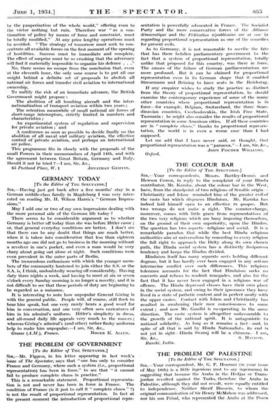THE COLOUR BAR
[To the Editor of THE SPECTATOR.] SIR,—Your correspondents, Messrs. Bartley-Dennis and Hewson Cowen, in reply to the complaint of your Hindu contributor, Mr. Karaka, about the colour bar in the West, haVe, from the standpoint of two religions of Semitic origin— Christianity and Islam—reminded him of the greater evil of the caste bar which disgraces Hinduism. Mr. Karaka has indeed laid himself open to an effective to quoque. But two wrongs do not make a right. The counter-charge, moreover, comes with little grace from representatives of the two very religions which are busy imposing themSelves, on the ground of their own superiority, upon the Hindus. The question has two aspects—religious and social. It is a remarkable paradox that while the best Hindu religious authorities aim at universalism by conceding to every religion the full right to approach the Deity along its own chosen path, the Hindu social system has a distinctly fissiparous tendency and keeps the Hindus divided:
Hinduism itself has many separate sects holding different dogmas, but it has hardly ever been engaged in any serious internecine conflict over such differences. This religious tolerance accounts for the fact that Hinduism seeks no converts and refuses to readmit renegades, and also for the fact that it has never been engaged in a religious war of offence. The Hindu depressed classes have their own place in the social system, and owing to their ignorance they have lived in a state of pathetic content and in perfect amity with the upper castes. Contact with Islam and Christianity has resulted in awakening their race consciousness to some extent ; and now Mr. Gandhi is co-operating in the same direction. The caste system is altogether unfavourable to the growth of the national spirit. It is antagonistic to national solidarity. As long as it remains a fact—and, in spite of all that is said by Hindu Nationalists, its end is not yet in sight—Hindu Swaraj will be a chimera.—I am,




































 Previous page
Previous page